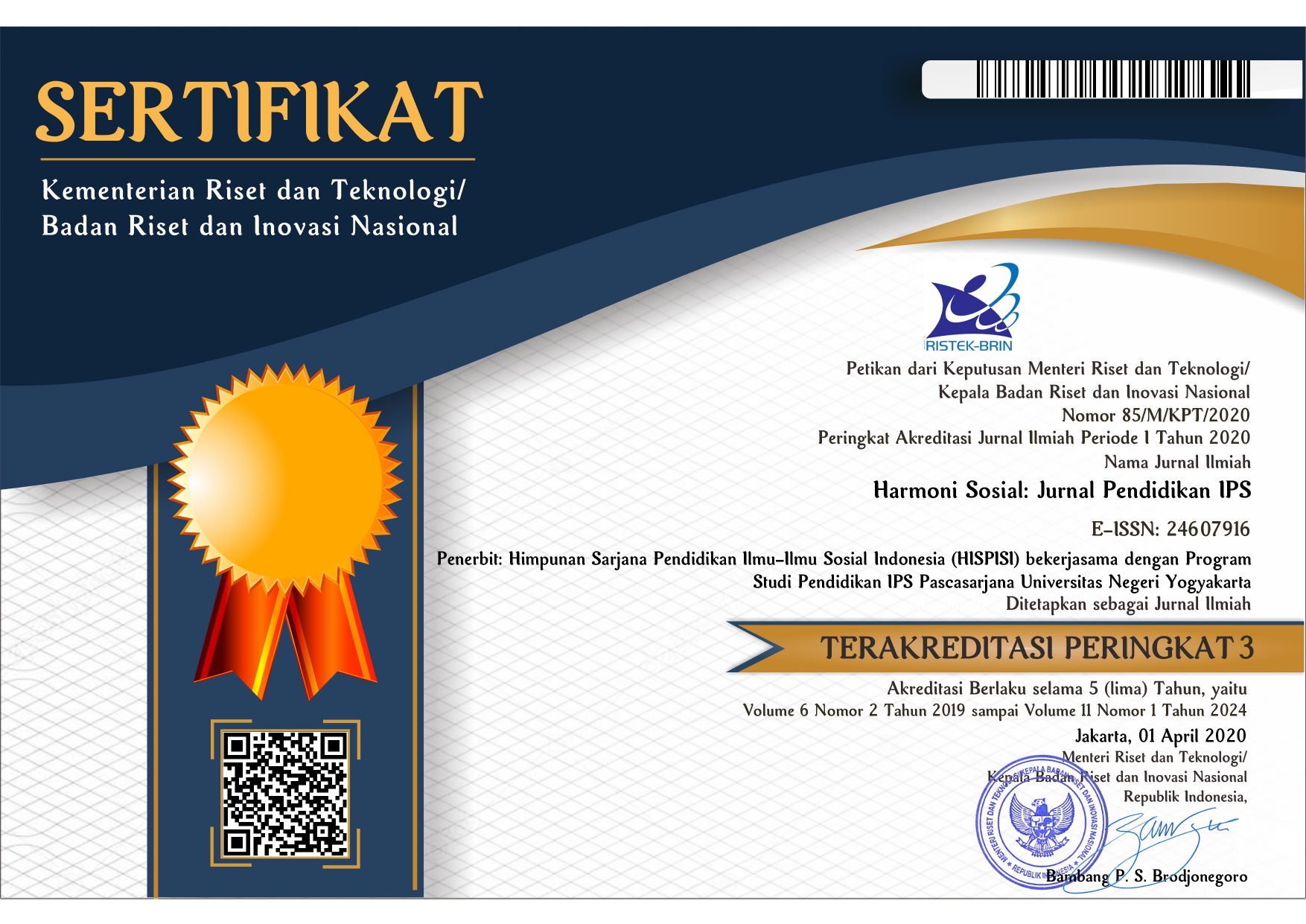Penguasaan civic skills aktivis badan eksekutif mahasiswa (studi di Universitas Negeri Yogyakarta)
Sunarso Sunarso, Pendidikan Kewarganegaraan dan Hukum, Universitas Negeri Yogyakarta, Indonesia
Abstract
Penelitian ini bertujuan mesndeskripsikan peranan, program, hambatan, upaya BEM UNY dalam meningkatkan civic skills aktivisnya. Pendekatan penelitian menggunakan kualitatif. Penentuan subjek dengan purposive sampling. Teknik pengumpulan data observasi, dokumentasi, wawancara. Teknik keabsahan data teknik triangulasi. Teknik analisis dengan reduksi data, sajian data, dan penarikan simpulan. Hasil penelitian (1) peranan BEM UNY dalam meningkatan civic skills adalah Partner kampus, fasilitator, pengabdian, selain itu BEM UNY mengalami dilema terkait kaderisasi dan diversifikasi gerakan. (2) program BEM UNY yang dapat meningkatkan civic skills, forum sekretaris kementerian, lembar pemantauan, sekolah kader bangsa, sosialisasi 100 hari kinerja BEM, dialog kebangsaan. (3) hambatan internal upaya meningkatkan civic skills, keterbatasan sumber daya manusia, banyaknya program kerja, keuangan. Hambatan eksternal, hal teknis dan perubahan kondisi sosial politik. (4) Upaya internal mengatasi hambatan peningkatan civic skill, perekrutan kader secara sistematik, mengutamakan program kerja, menjalin kemitraan. Upaya eksternal pengaktifan papan pengumuman, rapat kementerian secara rutin, pembacaan situasi sosial.
Kata kunci: civic skills, BEM UNY
THE MASTERY OF CIVIC SKILLS OF STUDENT EXECUTIVE BOARD ACTIVISTS (A STUDY IN STATE UNIVERSITY OF YOGYAKARTA),
Abstract
This study aims to describe the role, program, obstacles, BEM UNY efforts in improving the skills of civic activists. Using qualitative research approaches. Determining the subject with purposive sampling. Data collection techniques of observation, documentation, interviews. Technique authenticity of data triangulation technique. Mechanical analysis with data reduction, data presentation, and drawing conclusions. The results of the study (1) UNY BEM role in improving the civic skills are Partner campus, facilitator, devotion, besides UNY BEM has a dilemma related to the regeneration and diversification of movement. (2) UNY BEM program to improve civic skills, forum secretary ministry, monitoring sheets, school cadre nation, socialization 100 days performance of BEM, national dialogue. (3) internal barriers efforts to improve civic skills, limited human resources, the number of work programs, finances. External barriers, technical issues and changes in political and social conditions. (4) Efforts to overcome internal barriers to increase civic skills, recruitment of cadres systematically, prioritize work program, a partnership. Efforts to external activation bulletin boards, regular ministerial meetings, reading social situations.
Keywords: civic skills, BEM UNYKeywords
Full Text:
Fulltext PDFReferences
Amadeo, J-A. Torney-Purta, J., Barber, C. (2004). Attention to media and trust in media sources: analysis of data from the IEA Civic Education Study (Fact sheet, 8 pages). College Park: Center for Information and Research on Civic Learning and Engagement.
Charles, B & Patrick, J (1999). Principles and practices of education for democratic citizenship international perspective and projrcts. Bloomington: ERIC Publications.
Bass, B., M. (2000). The future of leadership in learning organizations. The journal of leadership studies, 7(3)
Billings, M.,S. & Terkla, D.,G. (2011). Using a structural equation model to describe the infusion of civic engagement in the campus culture. The Journal of General Education, 2(60).
Branson, M. S. (1999). Belajar civic education dari Amerika. (Terjemahan Syafruddin, M. Yasir Alimi, M. Nur Khoirun). Yogyakarta: LkiS.
Budiardjo, M. (1996). Teori-teori politik dewasa ini. Jakarta : PT. Raja Grafindo.
Foubert, J., D., & Grainger, L., U. (2006). Effects of involvement in clubs and organizations on the psychosocial development of first-year and senior college students. NASPA Journal, 43(1).
Harper, S., R, & Quaye, S.,J. (2007). Student organizations as venues for black identity expression and development among african american male student leaders. Philadelphia: Penn libraries.
Kirlin, M. (2002). The missing component in service programs?. Journal Civic skill building, 35(03).
Kirlin, M. (2003). The role of civic skills in fostering civic engagement. Fresno. CIRCLE (The Center for Information and Research on Civic Learning and Engagement).
Adnan, M. F. (2005). Pendidikan Kewarganegaraan (Civic Education) Pada Era Demokratisasi. Jurnal DEMOKRASI, 4(1).
Eisenberg, N & Spinrad, T.,L (2004). Emotion-related regulations: harpening the definition. Journal child development. 75(2).
Republik Indonesia. (2009). Undang-Undang Republik Indonesia Nomor 40 Tahun 2009. tentang Kepemudaan
Republik Indonesia. (2012). Undang-Undang RI Nomor 12 Tahun 2012 tentang Pendidikan Tinggi.
Suyasa, & Leny, T. Y. S. (2006). Keaktifan berorganisasi dan kompetensi interpersonal. Jurnal Phronesis, 8(1), 71-99.
Sugiyono. (2014). Memahami penelitian kualitatif. Bandung: Alfabeta.DOI: https://doi.org/10.21831/hsjpi.v4i2.9862
Refbacks
- There are currently no refbacks.
Copyright (c) 2018 Harmoni Sosial: Jurnal Pendidikan IPS

This work is licensed under a Creative Commons Attribution-ShareAlike 4.0 International License.
Our journal indexed by:
Printed ISSN (p-ISSN): 2356-1807 | Online ISSN (e-ISSN): 2460-7916
 This work is licensed under a Creative Commons Attribution-ShareAlike 4.0
This work is licensed under a Creative Commons Attribution-ShareAlike 4.0


















